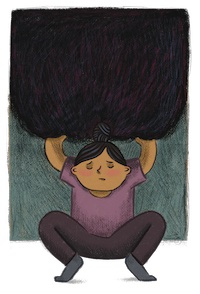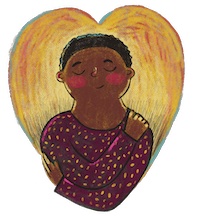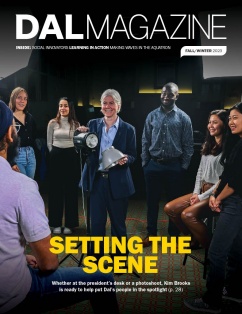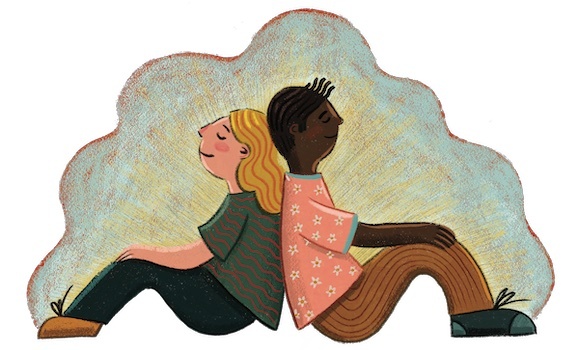When we think about what it means to feel “healthy” or “well,” what most often comes to mind is freedom from illness. But good health is about so much more than that. The World Health Organization (WHO) tells us, “Health is a state of complete physical, mental and social well-being and not merely the absence of disease or infirmity.”

It can seem more and more challenging every day to care for our health and well-being. We live demanding lives, and many of us feel the weight of expectations put on us from school, work, and life in general. Add to that the heavy current events in the 24-hour news cycle and it’s easy to see why people—and especially students, who are navigating huge life changes—might feel a bit weighed down.
Dr. David Pilon, a psychologist and Director of Counselling and Psychological Services at Dalhousie Student Health & Wellness says that while students come to the centre with all kinds of health issues, the top four presenting concerns have to do with mental health—anxiety, depressed mood and sadness, problems with sleep, or relationship concerns. He says these concerns tend to cluster together, resulting in an overall feeling of stress and making it difficult for students focus on their studies. The aim, then, is to help students cultivate resilience so they can not only navigate their academic demands, but also cope with everything life throws their way.
In August 2022, Dalhousie signed on to the Okanagan Charter, a call to action to post-secondary schools to “embed health into all aspects of campus culture and to lead health promotion action and collaboration locally and globally.” The charter, along with several other health frameworks used by the university, inspired the creation of the Be Well initiative, a plan to improve health and well-being across the entire university community—faculty, staff and students. This past summer, Be Well got underway with the Be Well Summit, an afternoon during which people from all across campus got together to brainstorm and set priorities for activities to improve well-being in the university community.
Related reading:��Dal reinforces commitment to health promotion by signing the Okanagan Charter (Dal News, 2022)

“There was such a tremendous sense of enthusiasm, and collaborative spirit, and optimism in the room that it was beyond inspiring,” Dr. Pilon said. “We are hoping the Be Well initiative becomes a grassroots Dalhousie community effort with the support of Dalhousie leaders, and that it will help to strengthen both individual and collective well-being for the community— whether it’s looking at very specific things we need to do to encourage members of our community to walk around this lovely campus for 10 or 15 minutes a day to ground themselves, up to looking at the policies of the university to ensure they are drafted through a lens of well-being.”
The well-being message is spreading fast, and Dr. Raghav Sampangi, a professor in the Faculty of Computer Science, has joined the movement. He makes well-being a priority in his own daily life, and in his approach to the classes he teaches. “The pandemic was a wake-up call, showing us the structural inequities that exist and has given us in academia a really good opportunity to develop more equitable forms of supports and to make more decisions through a well-being lens. I believe that each of us have the ability to influence and work towards such change.”
To this end, not only was he part of the organizing team for the Be Well Summit, he’s also instituted a few changes to how he works with his students. He’s put in place a “Life Happens” clause that allows those who need more time with assignments to take it, and he’s changed the focus of his grading away from point deductions toward feedback-based, non-numeric scales that emphasize the importance of iterative learning. He says he hopes it means grading will be less of a source of stress for students.

“We have an amazing opportunity to be courageous in making decisions to support the well-being of students, staff and faculty,” Dr. Sampangi says. “From what I can see, the right conversations are happening, including our Be Well Initiative and the Be Well Summit we had in the summer, and there is so much excellent work that is happening.”
Dr Sampangi’s way of leading with empathy in the classroom highlights the roles members of the university community can play in improving wellness outside a clinical context.
Dr. Pilon recalls an anecdote told during a session of the monthly Dalhousie Mental Health Forum (the regularly scheduled sessions where students, faculty, and staff can come together to talk in an unstructured way about mental health and well-being) about how reassuring it had been for a student to learn their professor was also experiencing difficulty.
“It highlighted for me the importance not only of what happens in the classroom, but the importance of each and every one of us in terms of who we can be and how we can be as we engage with students.”
It’s common for calls to come in to the Student Health and Wellness Centre from members of the campus community who are seeking information on how to help someone who they see is struggling. Dr. Pilon notes that in a setting where knowledge and expertise are highly valued, such as in a university, those who want to help don’t always feel confident in their skills because it’s outside their areas of expertise. But he tells them, “You have a PhD in life experience, and you can simply use your humanity and your compassion and your supportive, caring nature and say to that student ‘I’m here for you’.”

Dr. Sampangi echoes the sentiment. “I’m grateful that our world is more accepting of the wellness needs of people in our communities, and grateful for the many, many folks—including so many students worldwide—on social media who have shared their stories over the past few years advocating for a better and more compassionate world in general, and academia, in particular. I believe this has paved the way for all of us to be more accepting of topics of well-being, requests for supports, and in general, to be more compassionate, to be more human.”
This story appeared in the DAL Magazine Fall/Winter 2023 issue. Flip through the rest of the issue using the links below.


